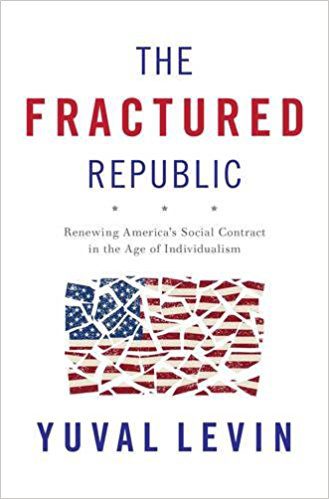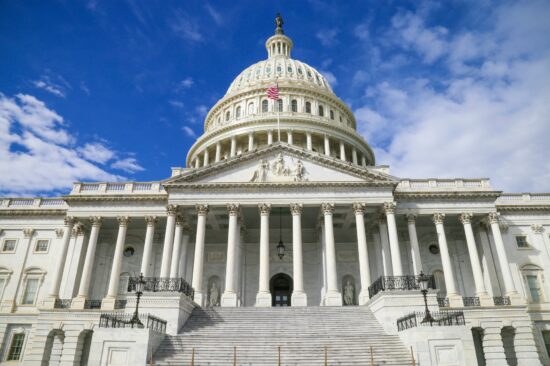The future is uncertain and life is unstable. At regular intervals, I find myself in conversations with fellow Christians who are anxious about America’s future. As a conservative evangelical, I lament both the speed and trajectory of the social change in our nation. In the name of progress, our culture has cast aside traditional beliefs about marriage, gender, sexuality, and personhood in order to achieve the highest of liberal virtues, egalitarianism and autonomy. This is devastating. But perhaps even worse, we must accept that there is no long-awaited hero poised to sweep in and turn the tide. America is changing, and it would be a fool’s errand to expect solutions from on high—that is to say, solutions from Washington or Hollywood. Even still, we should not despair.
Recently, I spent several weeks grappling with the contents of The Fractured Republic by Yuval Levin. (The book is magnificent and I commend it to you in the strongest possible terms.) Reading The Fractured Republic, I came away with several important conclusions. Chief among the lessons learned is the comforting truth that the sky is not falling. Though I, and many others like me, am deeply concerned about the near-cataclysmic shifts in the direction of our nation’s cultural mores and social policy, Levin’s reasoning brought me to the realization that even this does not necessarily signify impending doom.
Our society is complex and the trends of liberalization actually aren’t new at all. As Levin sets forth in the book, since the end of World War II, America has been on a “trajectory of increasing individualism, diversity, dynamism, and liberalization (2).” And this is both bad and good. While conservatives eagerly acknowledge that these trends have, perhaps greatly, negatively affected the “mediating institutions” of our culture—those middle layers of society such as family, church, community, work, and the marketplace—we readily accept the single greatest outcome this economic dynamism and increased specialization has produced, namely the inestimable increase to our own standards of living. And at the same time, many progressives applaud the advances wrought through our social liberalization while bemoaning the inequalities that accompany economic diffusion. Simply put, the America of midcentury is not the America of today. All of this to echo the words of Levin’s opening line, “Life in America is always getting better and worse at the same time” (1).
But as Christians, the most pressing issue we face today concerns faithfulness in the City of Man. For many decades, we have relentlessly engaged in a culture war that it appears we are destined to lose. We have sought to undo the evils of cultural liberalization, fought against an aggressive and ugly abortion movement, and worked to preserve America’s moral foundations through political action. All to no avail. Despite decades of activism and monumental efforts to elect government officials to every level of political office, we have, at best, only forestalled the inevitable. This wave of liberalization and diffusion will simply run its course. But we are the people of God, ambassadors of the eternal kingdom of Christ, and withdrawal is not an option.
It is in this way that the message of The Fractured Republic is most helpful for Christians like myself. In this age of individualism, Americans are distrustful of all things institutional. In fact, as our nation has diversified, the traditional elements and institutions which defined American life for so long have also been weakened by “the rise of expressive individualism.” Our common culture is no longer driven by a small number of cable outlets, major newspapers, elite universities, or giant corporations. Instead, we have experienced a “profusion of narrow grooves of cultural experience” yielding many more options for communicating, obtaining information, finding entertainment, and participating in public life. Through the culture wars of the past we have labored unsuccessfully—though admirably, at times—for dominance in the broader culture. But rather than continue in this effort, we should recognize that at this point, there is “barely a mainstream culture at all” (149). And in its place stands a diversity of subcultures. This is the silver lining for Christians.
Believers in the United States have always held that social liberalization would come at an enormous cost. And though we were right to assume that the Judeo-Christian worldview was in large part responsible for the “cohesion and success of American society,” it turns out that the populace is no longer united in this “general agreement about the virtues and benefits” our traditional beliefs (161). We can no longer boast of a consensus in our beliefs nor marshal the resources to enforce our objectives beyond our own circles. Thus, whatever the consequences of America’s liberal social policy, our remonstrations will do little to curtail its advance.
But this represents, for believers, a significant opportunity. For Christ has commanded his people to bear witness (Acts 1:8). As Levin suggests, perhaps our best opportunity to maintain our public witness is by “building thriving subcultures” (165). He writes, “Especially when we are in no position to enforce or enact our ideals as national norms, social conservatives need to emphasize and prioritize such modeling of alternatives—illustrating the possibility of a more appealing form of modern life by living it” (164). Here we see an alternative to the struggle for control of mainstream institutions that are surely passing away. Instead of those external battles, Christians and churches must see our primary means of cultural engagement as the faithful embodiment of our core beliefs.
Pursuing this course is not withdrawal. It is not retreat. If anything, it is to return to the incarnational and revolutionary message of Jesus. As Christians, we should redouble our efforts to ensure that our churches are filled with true believers committed to the gospel and faithful obedience to Christ. And we should pray to this end. If our local churches were recognized as places of hope, healing, and mercy; if our churches brought light to the darkness of their communities; if our churches were compelling expressions of the redemption found only in Christ; then with full integrity, our voice would resound as one crying out in the wilderness “prepare the way of the Lord” (Mark 1:3).
Beyond the heartache of seeing American culture reflect the horrors of Babylon, is the obvious truth that Christ has not called us to save America, but to bear witness. The true beauty of seeing the moral veneer of our culture slip away is the opportunity it offers the true bride of Christ to stand ready, shining in the darkness, to testify about the Light. I am grateful to Yuval Levin for the many insights I discovered in The Fractured Republic. And I am prayerful that Christians in America will take heed to maintain our prophetic voice, minority or otherwise.










